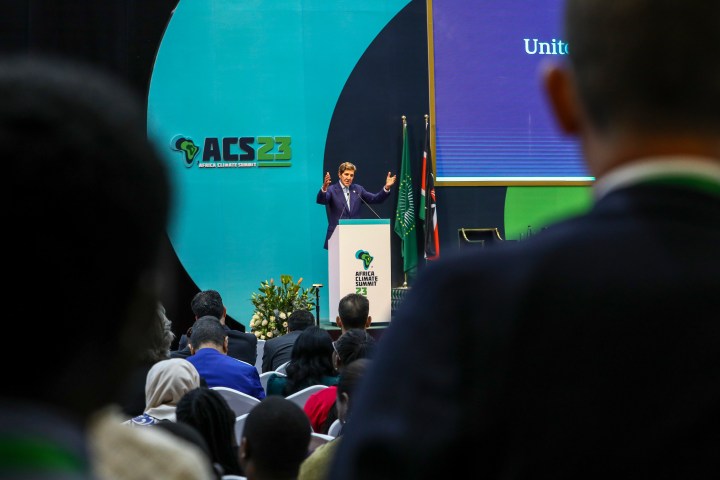Africa Carbon Markets Initiative
Hundreds of millions pledged for African carbon credits at inaugural climate summit

NAIROBI, Sept 4 (Reuters) - An initiative to boost Africa's carbon credit production 19-fold by 2030 drew hundreds of millions of dollars of pledges on Monday as Kenyan President William Ruto opened the continent's first climate summit.
In one of the most anticipated deals of the summit, the United Arab Emirates (UAE) committed to buying $450 million of carbon credits from the Africa Carbon Markets Initiative (ACMI).
The ACMI was launched at Egypt’s COP27 summit last year. African leaders are pushing market-based financing instruments such as carbon credits, which allow polluters to offset emissions through activities like planting trees or investing in renewable energy projects. (See EXPLAINER for more details)
Organisers of the three-day summit in Nairobi say they aim to showcase Africa as a destination for climate investment rather than a victim of floods, drought and famine.
African governments see carbon credits and other market-based financing instruments as critical to mobilize funding that has been slow to arrive from rich-world donors. Africa has received only about 12% of the money it needs to cope with climate impacts, according to a report last year by the non-profit Climate Policy Initiative.
“For a very long time we have looked at this as a problem. It is time we flipped and looked at it from the other side,” Ruto told delegates.
“We must see in green growth not just a climate imperative but also a fountain of multi-billion dollar economic opportunities that Africa and the world is primed to capitalise,” he said.
Several speakers at the summit, however, said they had seen little progress toward accelerating climate financing.
“There hasn’t been any success for an African country in attracting climate finance,” said Bogolo Kenewendo, a United Nations climate adviser and former trade minister in Botswana.
She said Africa was still struggling to attract capital despite significant improvements to the investment environment in many countries, largely because of a perception the continent is too risky.
More than 20 presidents and heads of government are expected to attend the summit from Tuesday. They plan to issue a declaration outlining Africa’s position ahead of a U.N. climate conference later this month and the COP28 U.N. summit in the UAE from late November.
INVESTMENTS
The oil-producing UAE has been positioning itself as a climate financing leader in Africa. Emirati company Blue Carbon has been in discussions with Liberia and Tanzania to set up carbon credit trading by overseeing conservation of their natural resources.
The $450 million commitment was announced by Hassan Ghazali, a UAE climate investment official.
Climate Asset Management – a joint venture of HSBC Asset Management and Pollination, a specialist climate change investment and advisory firm – also announced a $200 million investment in projects that will produce ACMI credits.
Also on Monday, Rawbank, one of Democratic Republic of Congo’s top lenders, and global energy trader Vitol VITOLV.UL announced a $20 million investment in renewable energy, clean cooking and forest conservation in Congo.
Britain said UK-backed projects worth 49 million pounds ($62 million) would be announced over the course of the summit. Germany announced a 60-million euro ($64.76 million) debt swap with Kenya to free up money for renewable energy and sustainable agriculture.
Many African campaigners have opposed the summit’s approach to climate finance, and about 500 people marched in downtown Nairobi on Monday to protest.
They say carbon credits are a pretext for continued pollution by wealthier countries and corporations, who should instead pay their “climate debt” through direct compensation and debt relief.
Sultan Al Jaber, president of COP28, said carbon markets were an important tool to mobilise the trillions of dollars needed to confront climate change, but acknowledged that they face a “crisis of confidence”.
“A lack of a commonly-agreed standard is undermining their integrity and diminishing their value,” he said in a speech.
A new working paper released by the Debt Relief for Green and Inclusive Recovery Project found that sub-Saharan African countries face annual debt servicing costs that are nearly the same as their climate finance needs.
By Duncan Miriri
(Reporting by Duncan Miriri; Additional reporting by Jefferson Kahinju; Writing by Aaron Ross; Editing by Angus MacSwan and Susan Fenton)




















Carbon credits are a big con – an excuse for allowing emissions to continue and are subject to manipulation and misleading reporting. A despicable form of bribery – let us carry on polluting and we’ll pay you.
The potential for graft & theft here is boundless. I’m sure this has caused an absolute frisson to run through the ranks of the corrupt. Heels clicking. Champers all around. Quite depressing, but as inevitable as the sun rising in the east.